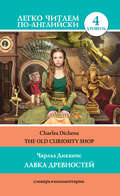
Чарльз Диккенс
Charles Dickens' Children Stories
"'Please may I – please, dear pa – may I – kiss Norah before I go?'
"Master Harry's father he takes Master Harry in his hand, and I leads the way with the candle to that other bedroom where the elderly lady is seated by the bed, and poor little Mrs. Harry Walmers junior is fast asleep. There the father lifts the boy up to the pillow, and he lays his little face down for an instant by the little warm face of poor little Mrs. Harry Walmers junior, and gently draws it to him.
"And that's all about it. Master Harry's father drove away in the chaise having hold of Master Harry's hand. The elderly lady Mrs. Harry Walmers junior that was never to be (she married a captain long after and went to India) went off next day."
POOR JO!
JO was a crossing-sweeper; every day he swept up the mud, and begged for pennies from the people who passed. Poor Jo wasn't pretty and he wasn't clean. His clothes were only a few poor rags that hardly protected him from the cold and the rain. He had never been to school, and he could neither write nor read – could not even spell his own name.
Poor Jo! He was ugly and dirty and ignorant; but he knew one thing, that it was wicked to tell a lie, and knowing this, he always told the truth. One other thing poor Jo knew too well, and that was what being hungry means. For little Jo was very poor. He lived in Tom-all-Alones, one of the most horrible places in all London. The people who live in this dreadful den are the poorest of London poor. All miserably clad, all dirty, all very hungry. They know and like Jo, for he is always willing to go on errands for them, and does them many little acts of kindness.
No one in Tom-all-Alones is spoken of by his name. Thus it is that if you inquired there for a boy named Jo, you would be asked whether you meant Carrots, or the Colonel, or Gallows, or young Chisel, or Terrier Tip, or Lanky, or the Brick.
Jo was generally called Toughy, although a few superior persons who affected a dignified style of speaking called him "the tough subject."
Jo used to say he had never had but one friend.
It was one cold Winter night, when he was shivering in a door-way near his crossing, that a dark-haired, rough-bearded man turned to look at him, and then came back and began to talk to him.
"Have you a friend, boy?" he asked presently.
"No, never 'ad none."
"Neither have I. Not one. Take this, and Good-night," and so saying the man, who looked very poor and shabby, put into Jo's hand the price of a supper and a night's lodging.
Often afterwards the stranger would stop to talk with Jo, and give him money, Jo firmly believed, whenever he had any to give. When he had none, he would merely say, "I am as poor as you are to-day, Jo," and pass on.
One day, Jo was fetched away from his crossing to a public-house, where the Coroner was holding an Inquest – an "Inkwich" Jo called it.
"Did the boy know the deceased?" asked the Coroner.
Indeed Jo had known him; it was his only friend who was dead.
"He was very good to me, he was," was all poor Jo could say.
The next day they buried the dead man in the churchyard hard by.
But that night there came a slouching figure through the court to the iron gate. It stood looking in for a little while, then with an old broom it softly swept the step and made the archway clean. It was poor Jo; and as he went away, he softly said to himself, "He was very good to me, he was."
Now, there happened to be at the Inquest a kind-hearted little man named Snagsby, and he pitied Jo so much that he gave him half-a-crown.
Jo was very sad after the death of his one friend. The more so as his friend had died in great poverty and misery, with no one near him to care whether he lived or not.
A few days after the funeral, while Jo was still living on Mr. Snagsby's half-crown, he was standing at his crossing as the day closed in, when a lady, closely veiled and plainly dressed, came up to him.
"Are you the boy Jo who was examined at the Inquest?" she asked.
"That's me," said Jo.
"Come farther up the court, I want to speak to you."
"Wot, about him as was dead? Did you know him?"
"How dare you ask me if I knew him?"
"No offence, my lady," said Jo humbly.
"Listen and hold your tongue. Show me the place where he lived, then where he died, then where they buried him. Go in front of me, don't look back once, and I'll pay you well."
Jo takes her to each of the places she wants to see. Then she draws off her glove, and Jo sees that she has sparkling rings on her fingers. She drops a coin into his hand and is gone. Jo holds the coin to the light and sees to his joy that it is a golden sovereign.
But people in Jo's position in life find it hard to change a sovereign, for who will believe that they can come by it honestly? So poor little Jo didn't get much of the sovereign for himself, for, as he afterwards told Mr. Snagsby —
"I had to pay five bob down in Tom-all-Alones before they'd square it for to give me change, and then a young man he thieved another five while I was asleep, and a boy he thieved ninepence, and the landlord he stood drains round with a lot more of it."
As time went on Jo's troubles began in earnest. The police turned him away from his crossing, and wheresoever they met him ordered him "to move on."
Once a policeman, angry to find that Jo hadn't moved on, seized him by the arm and dragged him down to Mr. Snagsby's.
"What's the matter, constable?" asked Mr. Snagsby.
"This boy's as obstinate a young gonoph as I know: although repeatedly told to, he won't move on."
"I'm always amoving on," cried Jo. "Oh, my eye, where am I to move to?"
"My instructions don't go to that," the constable answered; "my instructions are that you're to keep moving on. Now the simple question is, sir," turning to Mr. Snagsby, "whether you know him. He says you do."
"Yes, I know him."
"Very well, I leave him here; but mind you keep moving on."
The constable then moved on himself, leaving Jo at Mr. Snagsby's. There was a little tea-party there that evening, and when Jo was at last allowed to go, Mr. Snagsby followed him to the door and filled his hands with the remains of the little feast they had had upstairs.
And now Jo began to find life harder and rougher than ever. He lost his crossing altogether, and spent day after day in moving on. He remembered a poor woman he had once done a kindness to, who had told him she lived at St. Albans, and that a lady there had been very good to her. "Perhaps she'll be good to me," thought Jo, and he started off to go to St. Albans.
One Saturday night Jo reached that town very tired and very ill. Happily for him the woman met him and took him into her cottage. While he was resting there a lady came in and asked him very kindly what was the matter.
"I'm abeing froze and then burnt up, and then froze and burnt up again, ever so many times over in an hour. And my head's all sleepy, and all agoing round like, and I'm so dry, and my bones is nothing half so much bones as pain."
"Where are you going?"
"Somewheres," replied Jo, "I'm a-being moved on, I am."
"Well, to-night you must come with me, and I'll make you comfortable." So Jo went with the lady to a great house not far off, and there they made a bed for him, and brought him tempting wholesome food. Everyone was very kind to him, but something frightened Jo, and he felt he could not stay there, and he ran out into the cold night air. Where he went he could never remember, for when he next came to his senses he found himself in a hospital. He stayed there for some weeks, and was then discharged, though still weak and ill. He was very thin, and when he drew a breath his chest was very painful. "It draws," said Jo, "as heavy as a cart."
Now, a certain young doctor who was very kind to poor people, was walking through Tom-all-Alones one morning, when he saw a ragged figure coming along, crouching close to the dirty wall. It was Jo. The young doctor took pity on Jo. "Come with me," he said, "and I will find you a better place than this to stay in," for he saw that the lad was very, very ill. So Jo was taken to a clean little room, and bathed, and had clean clothes, and good food, and kind people about him once more, but he was too ill now, far too ill, for anything to do him any good.
"Let me lie here quiet," said poor Jo, "and be so kind anyone as is passin' nigh where I used to sweep, as to say to Mr. Snagsby as Jo, wot he knew once, is amoving on."
One day the young doctor was sitting by him, when suddenly Jo made a strong effort to get out of bed.
"Stay, Jo – where now?"
"It's time for me to go to that there burying-ground."
"What burying-ground, Jo?"
"Where they laid him as was very good to me, very good to me indeed he was. It's time for me to go down to that there burying-ground, sir, and ask to be put along of him. I wants to go there and be buried. Will you promise to have me took there and laid along with him?"
"I will indeed."
"Thankee, sir. There's a step there as I used to sweep with my broom. It's turned very dark, sir, is there any light coming?"
"It's coming fast, Jo."
Then silence for a while.
"Jo, my poor fellow – !"
"I can hear you, sir, in the dark."
"Jo, can you say what I say?"
"I'll say anything you say, sir, for I knows it's good."
"Our Father."
"Our Father – yes, that's very good, sir."
"Which art in Heaven."
"Art in Heaven. Is the light a-coming, sir?"
"It's close at hand. Hallowed be Thy name."
"Hallowed be Thy" —
The light had come. Oh yes! the light had come, for Jo was dead.
MRS. KENWIGS was the wife of an ivory turner, and though they only had a very humble home of two rooms in a dingy-looking house in a small street, they had great pretensions to being "genteel." The little Miss Kenwigs had their flaxen hair plaited into pig-tails and tied with blue ribbons, and wore little white trousers with frills round their ankles, the highest fashion of that day; besides being dressed with such elegance, the two eldest girls went twice a week to a dancing school. Mrs. Kenwigs, too, had an uncle who collected the water rate, and she was therefore considered a person of great distinction, with quite the manners of a lady. On the eighth anniversary of their wedding day, Mr. and Mrs. Kenwigs invited a party of friends to supper to celebrate the occasion. The four eldest children were to be allowed to sit up to supper, and the uncle, Mr. Lillyvick, had promised to come. The baby was put to bed in a little room lent by one of the lady guests, and a little girl hired to watch him. All the company had assembled when a ring was heard, and Morleena, whose name had been invented by Mrs. Kenwigs specially for her, ran down to open the door and lead in her distinguished great-uncle, then the supper was brought in.
The table was cleared; Mr. Lillyvick established in the arm-chair by the fireside; the four little girls arranged on a small form in front of the company with their flaxen tails towards them; Mrs. Kenwigs was suddenly dissolved in tears and sobbed out —
"They are so beautiful!"
"Oh, dear," said all the ladies, "so they are; it's very natural you should feel proud of that; but don't give way, don't."
"I can – not help it, and it don't signify," sobbed Mrs. Kenwigs: "oh! they're too beautiful to live, much too beautiful."
On hearing this dismal prophecy, all four little girls screamed until their light flaxen tails vibrated again, and rushed to bury their heads in their mother's lap.
At length she was soothed, and the children calmed down; while the ladies and gentlemen all said they were sure they would live for many many years, and there was no occasion for their mother's distress: and as the children were not so remarkably lovely, this was quite true.
Then Mr. Lillyvick talked to the company about his niece's marriage, and said graciously that he had always found Mr. Kenwigs a very honest, well-behaved, upright, and respectable sort of man, and shook hands with him, and then Morleena and her sisters kissed their uncle and most of the guests.
Then Miss Petowker, who could sing and recite in a way that brought tears to Mrs. Kenwigs' eyes, remarked —
"Oh, dear Mrs. Kenwigs, while Mr. Noggs is making that punch to drink happy returns in, do let Morleena go through that figure dance before Mr. Lillyvick."
"Well, I'll tell you what," said Mrs. Kenwigs. "Morleena shall do the steps, if uncle can persuade Miss Petowker to recite us the 'Blood-Drinker's Burial' afterwards."
Everyone clapped their hands and stamped their feet at this proposal, but Miss Petowker said, "You know I dislike doing anything professional at private parties."
"Oh, but not here!" said Mrs. Kenwigs. "You might as well be going through it in your own room: besides, the occasion."
"I can't resist that," interrupted Miss Petowker, "anything in my humble power, I shall be delighted to do."
In reality Mrs. Kenwigs and Miss Petowker had arranged all the entertainment between them beforehand, but had settled that a little pressing on each side would look more natural. Then Miss Petowker hummed a tune, and Morleena danced. It was a very beautiful figure, with a great deal of work for the arms, and gained much applause. Then Miss Petowker was entreated to begin her recitation, so she let down her back hair, and went through the performance with great spirit, and died raving mad in the arms of a bachelor friend who was to rush out and catch her at the words "in death expire," to the great delight of the audience and the terror of the little Kenwigses, who were nearly frightened into fits.
Just as the punch was ready, a knock at the door startled them all. But it was only a friend of Mr. Noggs, who lived upstairs, and who had come down to say that Mr. Noggs was wanted.
Mr. Noggs hurried out, saying he would be back soon, and presently startled them all by rushing in, snatching up a candle and a tumbler of hot punch, and darting out again.
Now, it happened unfortunately that the tumbler of punch was the very one that Mr. Lillyvick was just going to lift to his lips, and the great man – the rich relation – who had it in his power to make Morleena and her sisters heiresses – and whom everyone was most anxious to please – was offended.
Poor Mr. Kenwigs endeavored to soothe him, but only made matters worse. Mr. Lillyvick demanded his hat, and was only induced to remain by Mrs. Kenwigs' tears and the entreaties of the entire company.
"There, Kenwigs," said Mr. Lillyvick, "and let me tell you, to show you how much out of temper I was, that if I had gone away without another word, it would have made no difference respecting that pound or two which I shall leave among your children when I die."
"Morleena Kenwigs," cried her mother, "go down on your knees to your dear uncle, and beg him to love you all his life through; for he's more an angel than a man, and I've always said so."
Just as all were happy again, everyone was startled by a rapid succession of the loudest and shrillest shrieks, apparently coming from the room where the baby was asleep.
"My baby, my blessed, blessed, blessed, blessed baby! My own darling, sweet, innocent Lillyvick! Let me go-o-o-o," screamed Mrs. Kenwigs.
Mr. Kenwigs rushed out, and was met at the door of the bedroom by a young man with the baby (upside down) in his arms, who came out so quickly that he knocked Mr. Kenwigs down; handing the child to his mother, he said, "Don't be alarmed, it's all out, it's all over – the little girl, being tired, I suppose, fell asleep and set her hair on fire. I heard her cries and ran up in time to prevent her setting fire to anything else. The child is not hurt: I took it off the bed myself and brought it here to convince you."
After they had all talked over this last excitement, and discussed little Lillyvick's deliverer, the collector pulled out his watch and announced that it was nearly two o'clock, and as the poor children had been for some time obliged to keep their little eyes open with their little forefingers, the company took leave, declaring they had never spent such a delightful evening, and that they wished Mr. and Mrs. Kenwigs had a wedding-day once a week.





